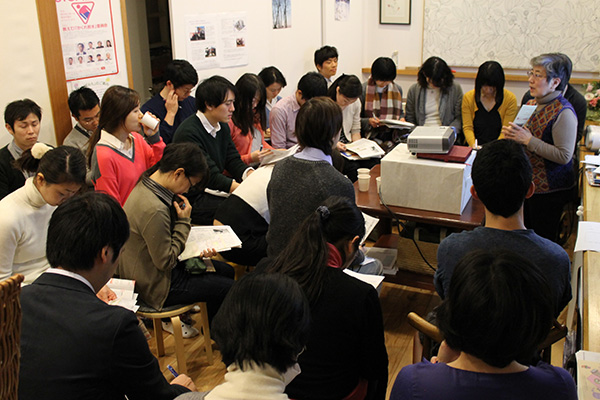2015年1月24日
1月24日 コアセミナー「暮らしの保健室」リポート
コアセミナー「暮らしの保健室」リポートコアセミナー後期では、6回にわたり様々な分野から講師の方をお招きしてきましたが、最終回となった1月24日は新宿区戸山ハイツにある「暮らしの保健室」にコース生が移動し、ケアーズ白十字訪問看護ステーション統括所長・秋山正子さんのお話をお伺いしました。
|
|
 |
|
| 右端が秋山正子さん。この場所には普段、メインテーブルが置かれている。 内装に木がたくさん使われているうえに、照明や部屋の仕切りにも工夫が施されているため、気持ちが安らぐ空間となっている。 |
|
| 受講生の感想 浜田麻里奈(工学系研究科修士1年) 秋山先生のお話を伺い、先生が建築空間のことに関心をもっておられることに驚きました。医療者は、建築空間、特に建築デザインが人に及ぼす影響まで関心を持つ方は少ないというイメージを持っていたためです。しかし、マギーズセンターの設計を有名建築家にお願いしたというお話を伺い、果たして設計された空間が本当に人に癒しを与える空間であるか疑問に感じました。有名建築家はあくまで設計コンペで勝ち抜き、有名になった人物であり、彼らのデザインメソッドは彼ら独自の新たな形態を追求し、中にはくつろぐというには奇抜すぎるものもあります。今後は、医療者が建築デザインに関心を持ちつつあることを考慮し、「癒し」の提案に特化した建築家が生まれて来てもよいのではと感じました。 |
|
 |
GLAFS Core Seminar Report “Daily Life Healthcare Room”The latter half of the GLAFS Core Seminar series included instructors from various fields. At the last seminar on January 24, all students visited the Daily Life Healthcare Room located in Toyama Heights in Shinjuku ward. There, participants heard from Ms. Masako Akiyama, Chief Director of CARES White Cross home nursing organization. The Daily Life Healthcare Room was established in 2011 to provide patients with information regarding health and their daily lives, and to act as a bridge between patients, hospitals, and community physicians.
|
|
 |
|
| Ms. Masako Akiyama on the far right. A table is usually placed in this location. The venue is a cozy and comfortable place since the room is designed with creative lighting and room partitions. |
|
| Feedback from seminar participant Marina Hamada, 1st year master’s student from the School of Engineering. I was surprised to find that Ms. Akiyama has a keen interest in architectural space. I didn’t think that health-care professionals paid attention to the impact of architectural spaces on people. However, I began to question whether architectural spaces could provide a sense of comfort to people when I heard that Ms. Akiyama requested a distinguished architect for the interior design of Maggie’s Center. Prominent architects become famous after winning architectural competitions. Their design methods tend to pursue a unique style, and sometimes these styles do not integrate a sense of comfort and ease. Taking into consideration the fact that health-care professionals are interested in architectural design, I imagine that architects specializing in comfort-centric architectural design will emerge in the future. |
|
 |

